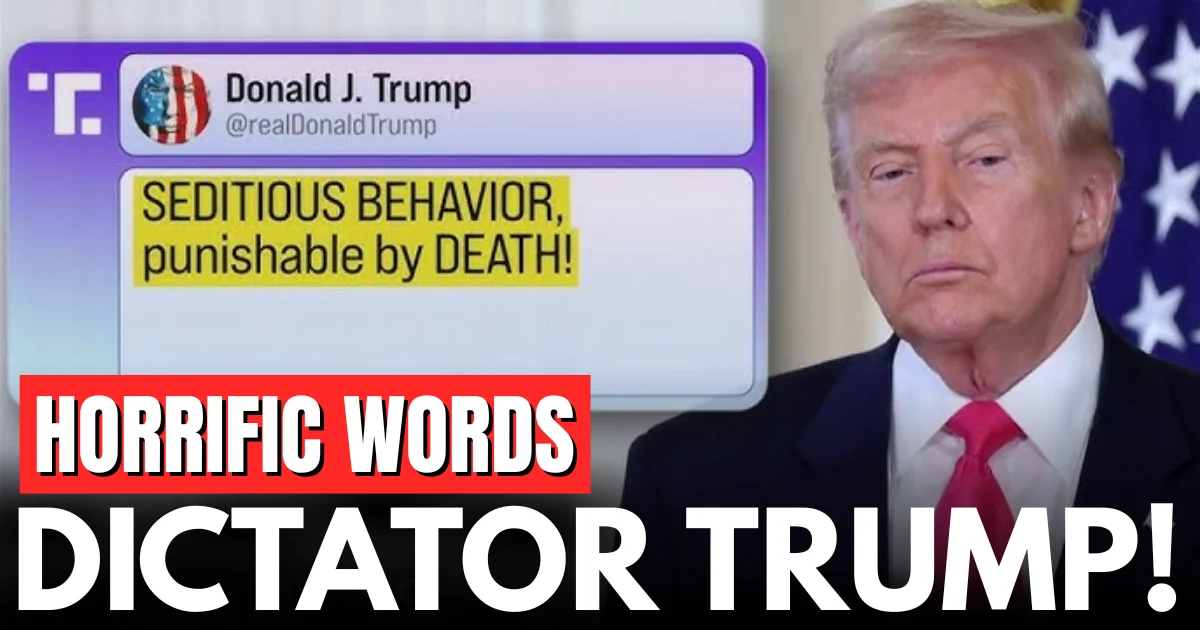Trump labels Democrat video to troops as sedition punishable by death. Constitutional analysis, free speech implications, and political reaction examined.
Table of Contents
Trump Labels Democrat Video to Military Troops as ‘Seditious Behavior, Punishable by Death’ Sparking Constitutional Debate
Former President Donald Trump characterized a video message from Democratic lawmakers to military personnel as “seditious behavior, punishable by death,” generating immediate controversy about political rhetoric, free speech principles, and democratic norms. The statement raises significant questions about appropriate political discourse and understanding of constitutional protections.
Legal experts, constitutional scholars, and political observers immediately responded to the remarks, emphasizing that political speech—even criticism of government officials—receives robust First Amendment protection. The incident highlights ongoing tensions about political rhetoric boundaries and constitutional principles governing democratic opposition.
Context of the Statement
Trump’s characterization came in response to a video message from Democratic congressional members addressing U.S. military service members. The video’s content and Trump’s reaction became subjects of immediate political and constitutional analysis.
The Democratic video:
Democratic lawmakers recorded a message to troops discussing various policy positions and expressing support for military personnel. Such messages to service members represent common practice across political parties.
The video content included criticism of certain administration policies and alternative perspectives on governance approaches. Political opposition expressing differing views represents fundamental democratic function.
No evidence suggests the video encouraged military insubordination, violence, or illegal activity. Constitutional experts note that policy disagreement expressed to military personnel doesn’t constitute sedition under legal definitions.
Trump’s response:
The former president characterized the Democratic communication as seditious behavior in social media posts and public statements. His comments included references to capital punishment.
The statement represents escalation in political rhetoric characterizing opposition activities as treasonous or seditious. Such language departs from traditional democratic norms about legitimate political opposition.
Legal Definition and Constitutional Context of Sedition
Understanding sedition’s actual legal meaning provides essential context for evaluating Trump’s characterization.
Historical sedition laws:
The Alien and Sedition Acts of 1798 criminalized criticism of the federal government but expired and faced lasting condemnation as unconstitutional violations of free speech. These laws represented dark chapter in American civil liberties history.
World War I era Sedition Act of 1918 prohibited criticism of government, military, or flag but was repealed in 1920. Subsequent Supreme Court decisions established stronger First Amendment protections.
Smith Act of 1940 prohibited advocating government overthrow but Supreme Court rulings significantly narrowed its application. Modern constitutional law provides robust protection for political speech.
Current legal standards:
Contemporary seditious conspiracy law (18 U.S.C. § 2384) requires conspiring to use force against the United States government or to oppose its authority by force. The statute demands specific intent to use violence or force.
Political speech, criticism of government, or policy disagreement—even harsh criticism—does not constitute sedition absent incitement to imminent lawless action. Brandenburg v. Ohio (1969) established strict standards protecting political speech.
Simply expressing opposition to policies, even to military audiences, receives full First Amendment protection. Constitutional law strongly safeguards political dissent as fundamental democratic right.
Death penalty considerations:
Federal seditious conspiracy convictions carry maximum 20-year prison sentences, not death penalty. Capital punishment doesn’t apply to sedition offenses under current law.
Treason represents the only political crime potentially carrying death penalty, requiring levying war against the United States or providing aid and comfort to enemies. Constitutional requirements include two witnesses to overt acts or confession in open court.
Constitutional Free Speech Principles
The First Amendment provides robust protection for political speech, particularly criticism of government officials and policies.
Core free speech protections:
Political speech receives the highest level of First Amendment protection. The Supreme Court consistently holds that criticism of government represents essential democratic function.
Content-based restrictions on political speech face strict scrutiny with courts presuming unconstitutionality. Government cannot suppress speech simply because it disagrees with the message.
Criticism of public officials, including presidents, receives especially strong constitutional protection. New York Times v. Sullivan and subsequent cases establish that public figures face high bars for restricting critical speech.
Limited exceptions:
True threats—statements meant to communicate serious intent to commit violence—may fall outside First Amendment protection. However, political hyperbole and heated rhetoric generally receive protection.
Incitement to imminent lawless action represents narrow exception requiring speech directed to producing imminent lawless action and likely to produce such action. Abstract advocacy receives protection.
Expert Legal and Constitutional Analysis
Constitutional scholars and legal experts responded swiftly to Trump’s characterization of the Democratic video.
Constitutional law professors:
Leading First Amendment scholars emphasized that political speech to military personnel criticizing policies clearly receives constitutional protection. No legitimate legal basis exists for sedition charges based on policy disagreement.
Experts noted that characterizing protected political speech as capital offense represents fundamental misunderstanding of constitutional law. Such statements could create chilling effects on legitimate democratic discourse.
Former government attorneys:
Attorneys with Justice Department and military legal experience explained that sedition requires conspiring to use force against government, not expressing policy disagreement. The Democratic video contains no elements meeting legal sedition definitions.
National security law experts distinguished between legitimate political opposition and actual threats to government. Democratic processes depend on robust political debate and criticism.
Civil liberties organizations:
ACLU and similar organizations issued statements reaffirming that political speech receives comprehensive First Amendment protection. They emphasized dangers of characterizing legitimate opposition as treasonous or seditious.
Political Reactions Across Spectrum
Trump’s statement generated responses from various political quarters reflecting broader debates about rhetoric and democratic norms.
Democratic responses:
Democratic lawmakers characterized Trump’s statement as dangerous rhetoric threatening democratic discourse. They emphasized constitutional rights to criticize government policies.
Party officials noted that threatening political opponents with death penalties for protected speech represents authoritarian approach incompatible with democratic governance.
Republican perspectives:
Republican reactions varied with some defending Trump’s rhetoric as political hyperbole while others expressed concern about characterizing opposition speech as capital offense.
Some conservative constitutional scholars noted that regardless of political views, First Amendment protections apply equally across political spectrum. Principle-based analysis supports protecting speech regardless of content.
Independent constitutional voices:
Non-partisan constitutional organizations emphasized that protecting political speech—including criticism from all sides—represents fundamental American principle. Democratic health requires robust protection for dissenting views.
Historical Context of Political Rhetoric
Examining historical patterns of political rhetoric provides perspective on current statements.
Democratic norms evolution:
American political tradition generally recognizes legitimate opposition as essential democratic function. The loyal opposition concept acknowledges that disagreement serves constitutional system.
Characterizing political opponents as traitors or seditionists represents departure from democratic norms. While harsh political rhetoric has historical precedents, threatening opposition with capital punishment crosses traditional boundaries.
Authoritarian rhetoric patterns:
Autocratic systems typically characterize political opposition as treasonous or seditious. Democratic systems distinguish between legitimate dissent and actual threats to constitutional order.
Using state power threats against political speech represents hallmark of authoritarian governance. Democratic systems protect robust political debate including harsh criticism.
Impact on Civil Discourse and Democratic Norms
Rhetoric characterizing political opposition as capital offenses affects broader democratic culture and discourse standards.
Chilling effects on political speech:
When political leaders characterize opposition speech as punishable by death, it creates environments discouraging legitimate political participation. Democratic systems require protecting space for dissenting views.
Military and civilian officials might hesitate engaging in protected political activity if characterized as capital offenses. Self-censorship harms democratic deliberation.
Normalization concerns:
Repeatedly using extreme characterizations for routine political opposition risks normalizing authoritarian rhetoric. Democratic cultures require maintaining distinctions between legitimate dissent and actual threats.
International democratic standing:
American leadership on global democratic norms faces questions when domestic rhetoric threatens political opponents with capital punishment. International observers note inconsistencies with professed democratic values.
What Constitutional Principles Require
Democratic governance depends on specific constitutional principles that statements like Trump’s appear to contradict.
Essential democratic protections:
Free speech rights especially for political criticism represent foundational democratic principles. Systems without robust opposition speech protection cannot claim democratic credentials.
Equal application of law regardless of political affiliation ensures fair governance. Threatening political opponents with capital punishment for protected speech violates equal protection principles.
Peaceful transfer of power and legitimate opposition acceptance represent hallmarks of stable democracy. Systems where political opponents face death threats for speech exhibit authoritarian characteristics.
Moving Forward: Democratic Discourse Standards
Political leaders, citizens, and institutions face questions about maintaining democratic discourse standards.
Responsibility of political leaders:
Public officials’ rhetoric affects democratic culture and norms. Leaders modeling constitutional principles and democratic values strengthen governance systems.
Distinguishing between legitimate criticism and actual threats to constitutional order requires careful judgment. Hyperbolic characterizations of routine opposition undermine this crucial distinction.
Media and civic education roles:
Journalism emphasizing constitutional principles and democratic norms helps citizens evaluate political rhetoric. Explaining First Amendment protections and sedition’s actual legal meaning serves educational function.
Civic education about constitutional rights and democratic governance creates informed citizenry capable of evaluating political claims critically.
FAQ SECTION
1. Is criticizing government policies actually seditious behavior?
No. Constitutional law clearly establishes that political speech criticizing government policies receives robust First Amendment protection and does not constitute sedition. Federal seditious conspiracy law requires conspiring to use force against the United States government, not merely expressing policy disagreement. Supreme Court precedents including Brandenburg v. Ohio establish that political speech, even harsh criticism, is protected absent incitement to imminent lawless action. Policy disagreement represents fundamental democratic function, not criminal behavior.
2. Can sedition be punished by death under U.S. law?
No. Federal seditious conspiracy convictions carry maximum 20-year prison sentences under current law (18 U.S.C. § 2384), not death penalty. Capital punishment doesn’t apply to sedition offenses. Treason represents the only political crime potentially carrying death penalty, requiring levying war against the United States or providing aid and comfort to enemies, with constitutional requirements including two witnesses to overt acts or confession in open court.
3. Does the First Amendment protect political speech to military personnel?
Yes. The First Amendment protects political speech regardless of audience, including communications to military service members. Political leaders from all parties routinely address military personnel about policy positions. Unless speech incites imminent lawless action or constitutes true threats, it receives constitutional protection. Expressing policy disagreement to troops doesn’t constitute sedition or any other crime under U.S. law.
4. Why do constitutional experts consider this statement problematic?
Legal scholars emphasize that characterizing protected political speech as capital offense represents fundamental misunderstanding of constitutional law and threatens democratic norms. Such rhetoric creates chilling effects on legitimate political participation, departs from American democratic traditions recognizing loyal opposition, and mirrors authoritarian systems that characterize political dissent as treasonous. Democratic governance depends on protecting robust political debate including criticism of officials and policies.
5. What are the implications for democratic discourse?
When political leaders characterize routine opposition speech as punishable by death, it discourages legitimate political participation, normalizes authoritarian rhetoric, and undermines distinctions between protected dissent and actual threats. Democratic systems require maintaining space for dissenting views and protecting political speech. Rhetoric threatening political opponents with capital punishment for protected speech contradicts democratic principles and constitutional values essential to American governance.
CONCLUSION
Former President Trump’s characterization of a Democratic video to military personnel as “seditious behavior, punishable by death” raises serious concerns about understanding constitutional principles and maintaining democratic norms. Legal experts uniformly agree that political speech criticizing government policies receives robust First Amendment protection and doesn’t constitute sedition under any legitimate legal definition.
The incident highlights tensions between heated political rhetoric and constitutional principles protecting political dissent as fundamental democratic function. Democratic governance depends on robust protection for opposition speech, including criticism of officials and policies across the political spectrum.
For American democracy, maintaining distinctions between legitimate political opposition and actual threats to constitutional order remains essential. Rhetoric characterizing protected political speech as capital offenses contradicts foundational principles and risks normalizing authoritarian approaches incompatible with democratic governance.
Understanding constitutional protections, legal definitions, and democratic norms helps citizens evaluate political rhetoric critically and maintain commitment to principles enabling self-governance through peaceful democratic processes.
This article provides educational analysis of constitutional principles and political rhetoric. It does not constitute legal advice or represent partisan political advocacy.

